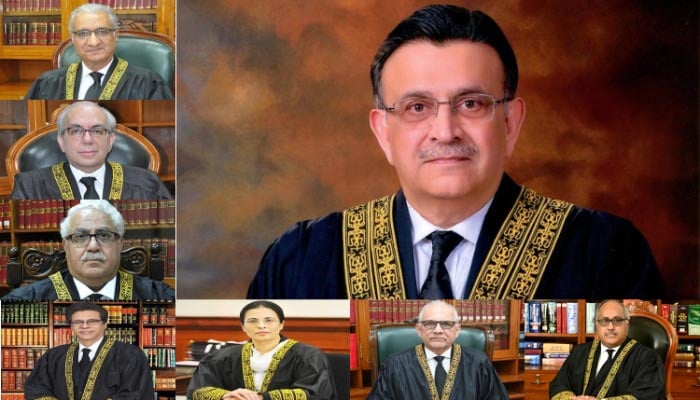SC bill: Reference filed against 8-member bench for ‘serious misconduct’
Complainant claims these judges have "consistently acted" in violation of Article 209 of constitution and Code of Conduct to be observed by judges
ISLAMABAD: Lawyer Mian Dawood on Friday filed a reference against an eight-member large bench of the Supreme Court constituted to hear petitions challenging a bill seeking to curtail the powers of the chief justice of Pakistan (CJP).
The lawyer — who earlier filed a reference against Justice Mazahar Ali Akbar Naqvi — filed a 10-page reference before the Supreme Judicial Council alleging that CJP Umar Ata Bandial and seven other justices for being guilty of serious misconduct under Articles III, IV, V VI, and IX of the code of conduct.
It should be noted that the eight-member SC bench has been facing constant criticism since its formation two days ago with the coalition government rejecting the larger bench, claiming it to be “controversial” as it is a “testament to the division of the apex court”.
He wrote: “I am placing before the Council the misconduct on part of the following 8 Judges of the Supreme Court of Pakistan", including chief justice:
- Justice Umar Ata Bandial
- Justice Ijaz ul Ahsan
- Justice Munib Akhtar
- Justice Sayyed Mazahar Ali Akbar Naqvi
- Justice Muhammad Ali Mazhar
- Justice Ayesha Malik
- Justice Syed Hasan Azhar Rizvi
- Justice Shahid Waheed
He claimed that these judges have consistently acted in violation of Article 209 of the Constitution and the Code of Conduct to be observed by judges of the Supreme Court and of the high courts, as issued by the Supreme Judicial Council.
Advocate Dawood wrote that CJP and the seven judges have “consistently and blatantly” violated the following “golden rules” of judicial conduct:
- Article III — Keeping a judge’s conduct in all things, official and private, free from impropriety;
- Article IV — enshrine the rule against bias and conflict of interest either direct or indirect;
- Article V — ensuring that justice is not only done but is also seen to be done;
- Article VI — counsel against engaging in public controversy, least of all on a political question
- Article IX — non-employment of the influence of a judge’s position to gain undue advantage, whether immediate or future and maintenance of harmony within his own court, as well as among all courts and for the integrity of the institution of justice.
“They have violated the Article 209 (5) of the Constitution, ie, when a judge becomes incapable of performing his judicial function or is found to be guilty of misconduct,” the complainant wrote.
Lawyer Dawood alleged that Justice Bandial’s misconduct is three-fold, that is:
- Firstly, he fixed the petition in his self-interest the bill was aimed to structure his own absolute powers
- Secondly, he himself presided over the bench hearing the matters; thereby, violating all rules of propriety and administration of justice
- Thirdly, the chief justice-led bench passed an “obviously glaring illegal, unconstitutional and mala fide order and anticipatory order.”
Lawyer Dawood accused the “four future chief justice”, including Justice Ahsan, Justice Akhtar, Justice Malik, and Justice Waheed, of the same charges pressed against CJP Bandial.
Meanwhile, he alleged that the “3rd category of justices” — including Justice Naqvi, Justice Mazhar, and Justice Rizvi — are also guilty of the same offence along with “being incompetent and for making themselves part of a partisan power grab by the Chief Justices and for being part of quid pro quo arrangement with the Chief Justice. They all were elevated out of turn, in violation of seniority principles.”
Dawood further claimed that CJP Bandial has engaged in “judicial and administrative misconduct” by refusing to probe allegations against Justice Naqvi and also by announcing in open court that “he was giving a ‘silent message’, by including Justice Naqvi on the bench with him, instead of initiating proceedings against the judge.”
Last month the Pakistan Bar Council (PBC) filed a reference against Justice Naqvi in the Supreme Judicial Council for “misconduct” after his name surfaced in connection with the audio leaks purportedly involving him, former Punjab chief minister Parvez Elahi and others.
“CJ pre-judges the references, declared Justice Naqvi to be innocent and impliedly threatened to proceed against the complainant(s),” he wrote, adding that the “bias of CJP is quite evident”.
The lawyer accused CJP Bandial of being involved in “bench-fixing, in order to favour certain political parties”.
“Chief Justice Bandial has been actively involved disregarding the seniority principle in elevation of the judges of the High Court to the Supreme Court in violation of the Constitution and well-established constitutional convention/practice as well as the law laid down by the apex court in the 1996 Al Jehad Trust and the 1998 Malik Asad Ali case. It is imperative that the actions of the Chief Justice Mr. Justice Umar Ata Bandial be inquired into urgently, as justice being dispensed in such a partisan and authoritarian manner leaves no room for public trust in the judiciary,” he wrote.
-
Security forces gun down 30 terrorists in multiple IBOs in KP: ISPR
-
MQM-P calls for new province in Sindh
-
US report validates Pakistan military edge over India: PM
-
Banned TTP poses serious threat to Pakistan security: UNSC panel
-
CM Afridi clarifies remarks on by-poll after ECP requests army deployment
-
Dubai sees 3.2m Pakistani passengers in 2025 as airport sets new milestone
-
Security forces kill 23 Indian proxy terrorists in KP's Kurram
-
Pakistan to construct island to boost oil exploration: report












